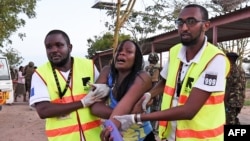Leaders from northeastern Kenya have said they will name sympathizers, fighters and financiers of Somali militant group al-Shabab. The pledge comes after al-Shabab gunmen killed nearly 150 students at Kenya's Garissa University College.
Analysts say it will be difficult to name the group's supporters in a region where people are divided along clan lines and the threat of al-Shabab looms over any attempt to help government agencies.
Days after al-Shabab gunmen killed 148 students at Garissa University College, leaders from northeastern Kenya, near the Somali border, have promised to help security organs identify youths who have joined the Islamist extremist group, as well as their sympathizers and financiers.
Parliament majority leader and lawmaker from the northeast, Aden Duale, said they would reveal the names within a few weeks.
"We recognize the reality of collaborators amongst our communities and we will, with immediate effect, commence to identify them, to document them, and to expose all the members, the financiers and sympathizers of al-Shabab within the next one month," he said.
Investigators are currently trying to learn more about the identity of the four attackers. One of the suspected attackers was a son of a local chief in Mandera county and a law school graduate.
In 2013, the father reported his son to the authorities and told them he suspected his son might have joined al-Shabab.
The Interior Ministry said Mohamed Mohamud, best known as "Gamadere," was the mastermind of the attack and was still on the run. Kenyan authorities has offered a $215,000 reward for his arrest.
Independent security analyst Abdiwahab Sheikh Abdisamad said clan divisions in the northeast would complicate efforts to identify other supporters of the terror group.
"In Mandera county, all the clans in that county are in conflict in one way or the other unless they reconcile them, unless they bring them on board, it's difficult to come up with a list," said Abdisamad. "If you bring a list, the other clan will say, 'Most of this list is from certain clan that they will consider as witch hunt.'"
In his speech to the nation on Saturday, President Uhuru Kenyatta said the task of countering terrorism in Kenya has been made difficult by the fact the planners and financiers of terrorist acts were embedded in Kenyan communities.
Duale noted there was radicalization taking place within Muslim community and institutions. He said there was a need to revamp the religious institutions and educators.
"We recognize that some of our religious institutions have had some role in radicalization and the propagation of these ideologies. To address this challenge we, in collaboration with the county government, a supreme council of Kenya Muslims, and a council of imams, we will immediately take a review of all personalities and institutions involved in the religious activities," said Duale.
Abdisamad agreed there was a problem, but people, who provided information about the militant group's activities, must be protected.
"The financiers, for instance, how are they going to pick the one who finances al-Shabab? Those who disclose the financiers, how are they going to be safe? Today, if they name one financier, those who name that financier they will be a victim of al-Shabab," said Abdisamad.
An Interior Ministry spokesman, Mwenda Njoka, told VOA the government welcomed the cooperation of Muslim leaders as authorities investigated the names provided to them in the ongoing probe.
Three days of national mourning end Tuesday. Families of 126 of the students killed in Garissa have been identified, 65 of them through fingerprints. The process of identification is still ongoing at a city mortuary as families await the clearance to receive the bodies of their children for burial.
